Chief of SSS Uzbekistan wraps up working visit to Tajikistan
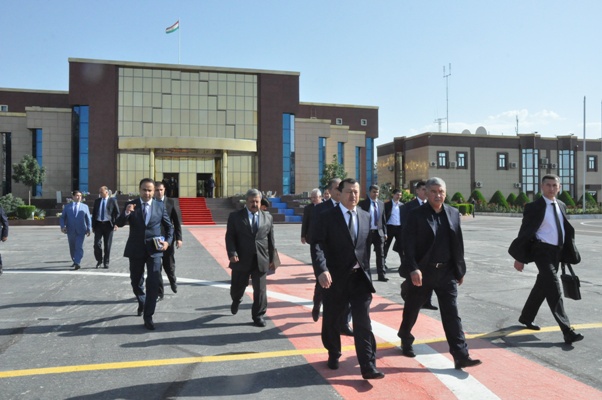
DUSHANBE, 13.06.2018. /NIAT «Khovar»/. The Chief of the State Security Service of Uzbekistan, Ikhtiyor Abdullayev, has returned home completing his two-day working visit to Tajikistan.
It should be noted that the talks of the Chiefs of security services of the two neighboring countries — Tajikistan and Uzbekistan were held in the spirit of openness, sincerity and constructive atmosphere.
The two sides exchanged views on action to jointly combating terrorism, extremism, transnational organized crime, and illegal drug trade; arms trafficking and agreed to promote interaction in the sphere of information.
The most important result of a meeting is the set of signing of Treaty of Mutual Cooperation and Security between State Committee for National Security of the Republic of Tajikistan and the State Security Service of Uzbekistan. The document was reportedly inked by Saymumin Yatimov, the chief of the State Committee for National Security (SCNS) of Tajikistan, and Ikhtiyor Abdullayev, the head of the State Security Service of Uzbekistan.
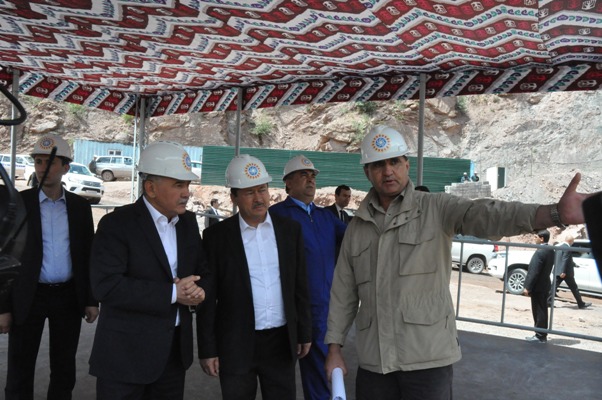 As part of his working visit to Tajikistan the head of the State Security Service of Uzbekistan, Ikhtiyor Abdullayev also visited the site for construction of the Roghun hydroelectric power plant (HPP) to get acquainted with the progress of construction of the facility.
As part of his working visit to Tajikistan the head of the State Security Service of Uzbekistan, Ikhtiyor Abdullayev also visited the site for construction of the Roghun hydroelectric power plant (HPP) to get acquainted with the progress of construction of the facility.
Diplomatic relations between the Republic of Tajikistan and the Republic of Uzbekistan were established on October 22, 1992. The Embassy of the Republic of Tajikistan in Tashkent functions since 1995.
Due to its economic development, geographical and geopolitical location, as well as to community roots and historical ties between the two neighboring countries, the Republic of Tajikistan pays constant attention to the further development and deepening of a wide range of mutually beneficial cooperation with the Republic of Uzbekistan.
The legal base of bilateral Tajik-Uzbek relations includes 111 contracts and agreements signed at the interstate, intergovernmental and interdepartmental levels in the period from 1992 to the present.
The approved documents between two countries cover all the key areas of cooperation between two countries and provide a solid legal basis for the further strengthening of bilateral cooperation between Tajikistan and Uzbekistan in the political, economic, trade and other areas.
The Treaty of Friendship, Good-neighborliness and Cooperation between Tajikistan and Uzbekistan, signed on January 4, 1993 in Tashkent and the Treaty of Eternal Friendship between Tajikistan and Uzbekistan signed on June 15, 2000 are rightly considered to be the main documents, which regulate the main directions of relations between Tajikistan and Uzbekistan.
The sides defined the main principles of bilateral relations in these documents – mutual respect for independence and sovereignty, equality, non-interference into the internal affairs of each other, their mutual desire to establish mutually beneficial economic partnership relations, both at the state level and at the level of economic entities.
Foreign trade analysis shows the negative trend, which led to a significant reduction of mutual supplies of goods and services between the Republic of Tajikistan and the Republic of Uzbekistan. There are all the necessary resources and reserves for the development of mutually beneficial cooperation in this important area.
It is enough to say that having a huge cultural and humanitarian space, shared borders and the developed communication system, we need to ensure the free movement of people, goods and services that will contribute to a more effective development of many sectors in the two countries and make fuller use of transit potential of each other for entering other markets.
History, common cultural and spiritual values, as well as centuries-old tradition of mutual respect and good neighborliness laid a solid foundation and the basic principles of relations between Tajikistan and Uzbekistan. These principles impose an equal responsibility on our countries and Tajikistan, on its side, is always set to consistently develop a broad, build on mutual trust, partnership with its nearest neighbor.











 Coins Dating Back to the 1st Century AD Discovered in Tajikistan
Coins Dating Back to the 1st Century AD Discovered in Tajikistan Trade Turnover Between Tajikistan and Pakistan Reaches $43 Million in 2025
Trade Turnover Between Tajikistan and Pakistan Reaches $43 Million in 2025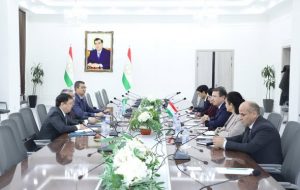 Days of Kazakh Medicine to Be Held in Tajikistan in 2026
Days of Kazakh Medicine to Be Held in Tajikistan in 2026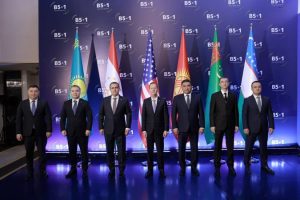 Tajikistan Highlights Investment Potential at B5+1 Forum in Bishkek
Tajikistan Highlights Investment Potential at B5+1 Forum in Bishkek Tajikistan and the United Arab Emirates plan to develop green energy
Tajikistan and the United Arab Emirates plan to develop green energy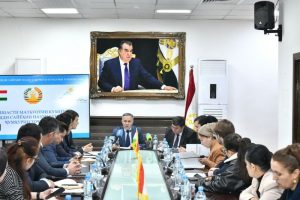 Growth in the Number of Tourism Service Providers in Tajikistan
Growth in the Number of Tourism Service Providers in Tajikistan Tajikistan, Abu Dhabi Fund Sign $100 Million Deal for Rogun Hydropower Plant
Tajikistan, Abu Dhabi Fund Sign $100 Million Deal for Rogun Hydropower Plant Norak Hydropower Plant Rehabilitation Phase One to Be Completed in December 2026
Norak Hydropower Plant Rehabilitation Phase One to Be Completed in December 2026 Tajikistan Begins Preparations for Transition to 12-Year Education System
Tajikistan Begins Preparations for Transition to 12-Year Education System Industrial Output in Tajikistan Reaches 66.7 Billion Somoni in 2025
Industrial Output in Tajikistan Reaches 66.7 Billion Somoni in 2025














